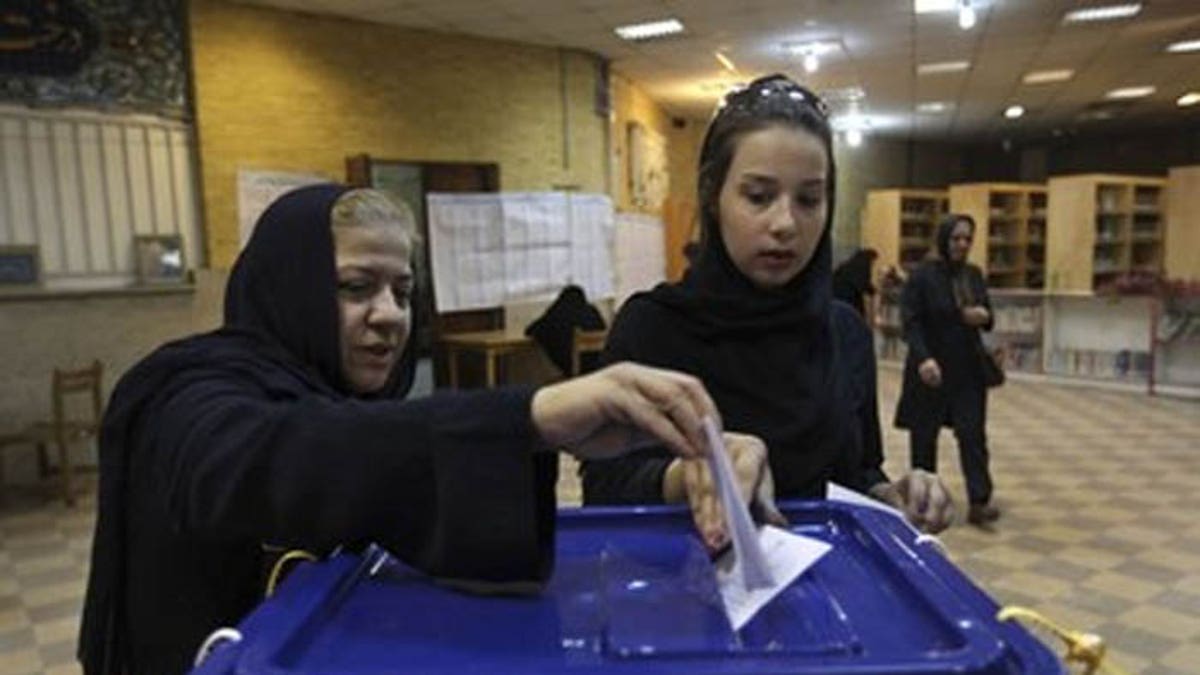
Although these two women are casting their votes for president in Tehran, thousands of Iranians around the world, including in the U.S., will also fill out ballots. (AP)
The Islamic Republic of Iran’s far-reaching tentacles have once again reached U.S. cities, where it has set up polling sites for Friday’s presidential election, hoping to get the participation of Iranian Americans.
Iran’s government announced earlier this week that polling sites will be set up in 19 official locations in the U.S., according to Iran’s election website.
Under U.S. law, it is illegal for the regime to engage in operations outside of a 25-mile radius of its permanent mission to the United Nations in New York, and within 12 miles of the Interests Section in the Pakistani embassy in Washington, DC.
The U.S.and Iran have not had diplomatic ties for over three decades.
According to a list published on the regime’s election website, six polling stations will be set up in California; two in Texas; two in the Washington, DC area; two in the New York city area; and others in Tampa, Philadelphia, Nashville, Chicago, Oklahoma city, Minneapolis, and Milwaukee.
“The regime doesn’t care much for the vote of Iranian Americans. But they want to have an influence here in the U.S.,” said Roozbeh Farahanipour, a pro-freedom activist in Los Angeles.
“They want to flex their muscles to the international community and stand up to the (anti-government) opposition abroad.”
The regime is setting up 290 polling stations in 96 countries in an effort to include expatriate Iranians in this year’s elections, Iranian Foreign Ministry Spokesman Abbas Araqchi said Tuesday.
In addition, the government outlined voting procedures in a four page document issued by the Interests Section, which operates in Washington D.C. out of the Pakistani embassy, stating that polling locations were being set up in coordination with the local police departments.
Instead of mailing in absentee ballots, the Iranian government requires those living abroad to show up in person and vote with proof of an Iranian passport.
Iranian election laws require that three government representatives from each of the Guardian Council, Foreign Ministry and Executive Election Board be present at every polling site.
This brings into question the lack of diplomatic ties between the two countries in addition to heavy sanctions on travel and on specific members of the government.
“This would mean that at least 60 government officials have come into the U.S. for Friday’s election,” Farahanipour said. “How did they all obtain visas?”
The Islamic Republic of Iran's permanent envoy to the United Nations, Mohammad Khazaee, said the elections in Iran are “the main symbol of democracy in the region,”according to IRIB English Radio, which took the report from the Islamic Republic’s News Agency’s interview earlier this week with Khazaee about the polling sites.
Khazaee was out of town and unavailable to comment.
Khazaee’s office referred Fox News to the Interests Section, which had no immediate response.
Canada is not allowing the regime to operate polling stations, a decision openly and sharply criticized by Tehran.
“Canada had deprived many Iranians of exercising their legal right,” Araqchi, said.
In total, Iranian voters will go to over 66,000 polling stations within Iran and abroad on Friday to elect current President Mahmoud Ahmadinejad’s successor, according to the Iranian Students News Agency (ISNA).
Many Iranians inside and outside the country are boycotting the election.
Eight candidates, vetted out of more than 600, by the Guardian Council had just three weeks to campaign for Election Day.
Currently, only six candidates remain in the race. They include Iran's former Foreign Minister Ali Akbar Velayati, current nuclear negotiator, Sayeed Jalili, former SNSC Secretary and chief nuclear negotiator Hassan Rowhani, Former Oil Minister of Iran, former Minister of Information and Communications Technology Mohammad Qarazi, Secretary of State Expediency Council and former Commander of Islamic Revolutionary Guards Corps Mohsen Rezayee, and Tehran Mayor Mohammad Baqer Qalibaf.
Pamela Browne contributed to this report
has publicly spoken about the establishment of U.S. polling stations, according to IRIB English Radio, which took the report from the Islamic Republic’s News Agency’s interview earlier this week with Khazaee about the polling sites.
According to the report, Khazaee stated that the elections in Iran are “the main symbol of democracy in the region,” IRIB said.
Khazaee was out of town and unavailable to comment.
Khazaee’s office referred Fox News to the Interests Section, which had no immediate response.
Canada is not allowing the regime to operate polling stations, a decision openly and sharply criticized by Tehran.
“Canada had deprived many Iranians of exercising their legal right,” Araqchi, said.
In total, Iranian voters will go to over 66,000 polling stations within Iran and abroad on Friday to elect current President Mahmoud Ahmadinejad’s successor, according to the Iranian Students News Agency (ISNA).
Many Iranians inside and outside the country are boycotting the election.
Eight candidates, vetted out of more than 600, by the Guardian Council had just three weeks to campaign for Election Day.
Currently, only six candidates remain in the race. They include Iran's former Foreign Minister Ali Akbar Velayati, current nuclear negotiator, Sayeed Jalili, former SNSC Secretary and chief nuclear negotiator Hassan Rowhani, Former Oil Minister of Iran, former Minister of Information and Communications Technology Mohammad Qarazi, Secretary of State Expediency Council and former Commander of Islamic Revolutionary Guards Corps Mohsen Rezayee, and Tehran Mayor Mohammad Baqer Qalibaf.
Pamela Browne contributed to this report
